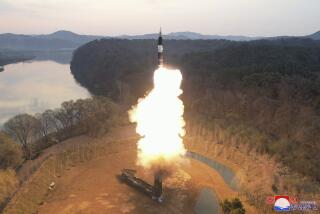CIA Reports New Korean Missiles : Weaponry: New models in early design stages are intended to reach as far as Guam, Jane’s report says.
- Share via
WASHINGTON — The CIA said Thursday that North Korea has begun designing two new ballistic missiles with sufficient range to “put at risk” all of Southeast Asia and parts of the Pacific, but it said the weapons still are in early stages of development.
CIA Director R. James Woolsey told a symposium here that the new missiles are intended to travel well beyond the 620-mile radius of the No-Dong missile that Pyongyang shot into the Sea of Japan last year. He said Washington will “monitor their development” closely.
The weapons’ existence was reported by Jane’s Defence Weekly, which said North Korea is designing one missile with a 1,200-mile range and another that it hopes will fly up to 2,180 miles--the distance from North Korea to the American territory of Guam.
U.S. officials have cautioned that no construction of any prototypes, let alone actual test flights, is imminent. Intelligence officials are divided over whether North Korea is building the missiles by itself or is getting help from China.
The disclosure came as the Clinton Administration indicated it is considering pressing for economic sanctions against North Korea in the wake of reports that seals on the international monitoring equipment at one of the country’s nuclear plants have been broken.
The seals were placed on the equipment by the International Atomic Energy Agency to guarantee that television cameras at the site were monitoring the plant without interruption. Tampering with them is considered a violation of international inspection procedures.
Winston Lord, assistant secretary of state for East Asian affairs, told the House Foreign Affairs Committee that Washington is losing patience with North Korea. Pyongyang has refused to allow officials of the international agency to inspect its nuclear facilities.
On Monday, the United States is expected to face a key decision on the North Korean issue when the agency meets to determine whether Pyongyang has violated international rules by refusing the inspections.
But even if the agency declares formally that North Korea has been blocking its inspection efforts, there is no guarantee that Washington can muster enough votes in the U.N. Security Council to impose economic sanctions anytime soon. China, for example, which can deliver a Security Council veto, reportedly opposes immediate sanctions. And South Korea, wary of Pyongyang’s response, is said to be against such a move.
Lord told the Foreign Affairs Committee on Thursday that “we will not stand idly by if we can’t continue to make progress.” He said the United States wants to see “a non-nuclear Korean peninsula” and will “resort to whatever measures are required to promote that.”
But officials conceded privately that Washington may have to wait some time before the Security Council actually takes up a sanctions resolution. Some countries already are pushing for less-formal restrictions that are not as likely to anger Pyongyang.
The uncertain outlook poses a dilemma for the Administration, which has been pressuring the North Koreans to comply with international inspection requirements for more than a year. Pyongyang agreed to go along earlier this month but since has reversed its position.
The United States already has canceled a planned third round of high-level talks with North Korea over the issue and is on the verge of rescheduling annual military exercises with South Korea that it had promised to drop if Pyongyang cooperated.
It was not immediately clear what the Administration would do if the nuclear agency refers the matter to the Security Council Monday. Lord held out hope Thursday that Pyongyang might “still reverse course.” It is “not impossible for them to do so,” he told the panel.
If true, North Korea’s reported tampering with inspection seals would be the first time that Pyongyang had violated monitoring procedures. Until now, the major issue in the dispute has been North Korean refusal to permit inspectors into the plant.
Meanwhile, Han Chang-on, deputy North Korean ambassador to the U.N. European headquarters in Geneva, criticized the United States for canceling the high-level talks, warning that Washington and the IAEA were jeopardizing any compromise.
“The present attitude of the United States and the IAEA could prevent a complete solution of the nuclear issue . . . if they continue actions like this,” he said in a news conference. The U.S. decision to cancel the high-level talks with North Korea and step up planning for the military exercises is intended as a final warning to Pyongyang before Monday’s meeting.
Although the exercises--known formally as Team Spirit--are partly symbolic, U.S. officials say that reviving them could prove costly to North Korea because Pyongyang traditionally has conducted counter-maneuvers.
More to Read
Sign up for Essential California
The most important California stories and recommendations in your inbox every morning.
You may occasionally receive promotional content from the Los Angeles Times.













